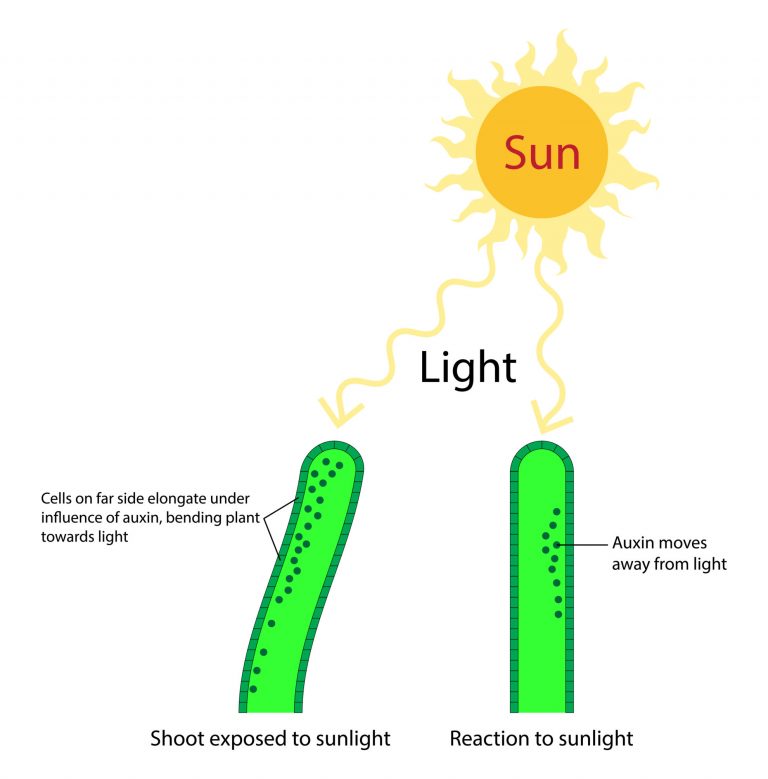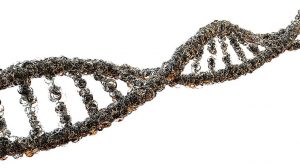Plant Auxins – Phototropism & Geotropism

Auxin as the plant hormone regulating phototropism
Table of Contents
As with animals, plants also use a variety of hormones to control their growth and development. A family of hormones called auxins are commonly found in plants, and promote (and sometimes inhibit) growth.
Auxins
Auxins are produced in the meristems of plants (meristems are explained on successive pages).
Auxins are responsible for promoting cell elongation, a process that is required before the differentiation of a cell. It is able to this by promoting the intake of water, increasing the elasticity of the cell to cope with the increase of water taken in by the cell.
One of the most common auxins is indole acetic acid.
Indole Acetic Acid (IAA)
Indole Acetic Acid affects the root and shoot tips of the plant, as described below.
- Shoot Tip – No matter what the concentration, IAA promotes growth in the shoot area of a plant (though higher concentrations promote growth more).
- Root Tip – High concentrations of auxin inhibit growth while small amounts are enough to promote growth in the root with indole acetic acid.
Phototropism
Auxins also play a part in phototropism, an occurrence that involves plants bending or moving away from light. The shoot tip is responsible for directional movement by the plant in response to sunlight, as this is the area where auxins can be found.
Sunlight eradicates auxin, meaning that the part of the shoot tip of the plant which is receiving direct sunlight will have the least amount of auxin.
The extra auxin present on the shaded side promotes more cell division and elongation, causing the plant to bend towards the sunlight after this lop-sided growth.
Geotropism
Geotropism is a similar occurrence to phototropism where the plant exhibits directional growth in response to gravity. The shoot tip illustrates negative geotropism (grows against the force of gravity) while the root tip exhibits positive geotropism (grows in the same direction as gravity).
Apical Dominance
The presence of auxins in the lateral areas of the plant (in between the root and shoot tip) prevent lateral growth. If you cut off the shoot tip of a plant, the lack of ‘diffusable’ auxins means that they cannot inhibit growth in these lateral areas. This is known as apical dominance.
Leaf Abscission
The presence of auxins in the lateral areas also prevents leaf abscission. In the colder months, auxin concentrations and the rate of photosynthesis drops.
This lack of auxin in the lateral areas results in the forming of an abscission layer at the stalk of the leaf, which weakens its connection with the plant and soon falls off it.
The next tutorial looks at another family of growth hormones, the gibberellin family, with continuing pages looking at the meristems, the sites of plant growth.
You will also like...

Ecological Research: Measuring & Analysis
This lesson is about the methods used for ecological research, such as quadrat and transect sampling, canopy fogging, an..

Genetics – Lesson Outline & Worksheets
Topics Modules Quizzes/Worksheets Description Introduction to Genetics Genetics – Definition: Heredity and ..

Genetic Information and Protein Synthesis
Genes are expressed through the process of protein synthesis. This elaborate tutorial provides an in-depth review of the..

Genetic Mutations
This tutorial looks at the mutation at the gene level and the harm it may bring. Learn about single nucleotide polymorph..

Population Regulation in an Ecosystem
With regard to the population size of a species and what factors may affect them, two factors have been defined. They ar..

Sigmund Freud and Carl Gustav Jung
In this tutorial, the works of Carl Gustav Jung and Sigmund Freud are described. Both of them actively pursued the way h..
